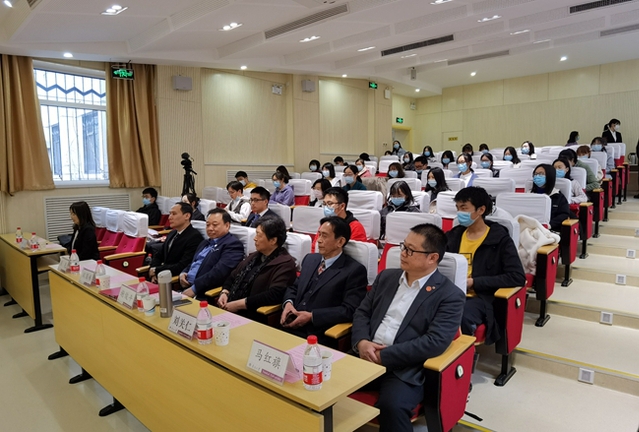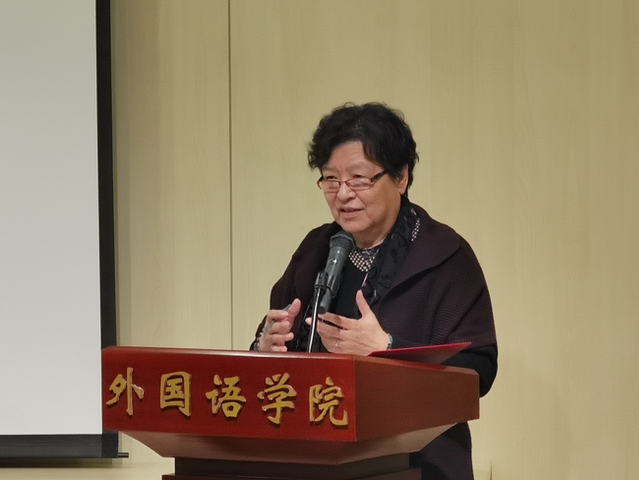
Recently, the opening ceremony of the 3rd Diplomat Talent Competition in Nankai University and Reporting Conference of former diplomat Xie Junping, was held in the lecture hall of the College of Foreign Languages. Xie Junping, the first Consul General in Consulate General of the People’s Republic of China in Frankfurt, former Ambassador Extraordinary and Plenipotentiary of the People’s Republic of China in Republic of Estonia, and Russian major alumna in the Class of 1970, Yan Guodong, Dean of the College of Foreign Languages, Zhang Yao, an instructor in Model United Nations Association of Nankai University, Vice Secretary of the CPC Committee and Vice Dean of the Faculty of history, Ma Hongqi, Vice Dean of the College of Foreign Languages, Xiang Yu, Vice Secretary of the CPC Committee and Vice Dean of the college, Zhao Guoqiang Director of the Office of the college, Wang Ziyu, instructor for undergraduate students in the class of 2020 in the College of Foreign Languages attended the opening ceremony.
As an instructor in Model United Nations Association of Nankai University, Zhang Yao vividly introduced the deeds and talents of Chinese ambassadors to abroad in the early years of the founding of the People's Republic of China in a Chinese historical biographical television series My Uncle Zhou Enlai. He suggested that to become a qualified diplomat, students should possess the national integrity like the first batch of diplomat and hoped that students could not only experience the diplomatic protocol between countries but also feel the patterns in the interpersonal communication.
WuXu Zhengzheng, an undergraduate student in the Class of 2018 from the Faculty of History and President of Model United Nations Association of Nankai University, delivered a speech on behalf of the competition’s organizing committee and members of the association. This Diplomat Talent Competition was the first activity organized by the Model United Nations Association after the COVID-19 Pandemic and was a platform particularly constructed for Nankai students. The aim of holding this competition was to encourage students to learn about knowledge of international organizations and put forward their views regarding international problems and appeal to students to actively participate into this competition, do a good job, display their talents and benefit from it.
Yan Guodong started from the perspective of cultivation and development of foreign language talents, emphasized the idea of talent cultivation of College of Foreign Languages where “students should be fostered to be experts in foreign languages, possess humanistic quality with international view, Chinese sensibility and Nankai characteristic.” He mentioned that in the Diplomat Talent Competition, students debated over and over again for a topic while in the diplomatic field, diplomats argued strongly on just grounds for fighting for national interests. In the light of that, students majoring in foreign languages should not merely limited themselves to the translation between languages. Instead, they were supposed to possess a wider view, and strive to become practitioners of foreign affairs, researchers of international issues, communicators of human civilization and providers of language services which were in great need in the cause of Reform and Opening-Up in China and “One Belt One Road” initiative.
In alumna Xie Junping’s special report, she initially put it that “I express my heartfelt gratitude to my alma mater for inviting me, an old student back and also express my heartfelt gratitude to my young schoolmates for listening to my speech.” She then said that the diplomacy of any country in the world served the highest interests of its own country, and all governments had high requirements for diplomats. Premier Zhou Enlai once put forward the 16-character guideline to diplomats who should have “unswerving loyalty, mastery of policies, professional competency and observance of discipline.” In the new historic period, General Secretary Xi Jinping also demanded that diplomats must “be loyal to the CPC, the country and the people and are politically solid, professionally competent and strongly disciplined in their conduct.” In the practice of implementing the central committee’s instructions and further fostering a cohort of diplomats, the ministry of foreign affairs summarized the core values that diplomats should possess, namely, loyalty, mission and dedication. No matter how times change, political loyalty was always the key requirement for diplomats. Diplomats of generations upheld the loyalty and love for their motherland, stuck to their post in anonymity and even sacrificed their life for safeguarding the supreme interests of the country. To bring their mission to fruition, firstly, diplomats ought to study hard all their lives and train themselves to be perfect at not only having one specialty but also mastering many other skills. Secondly, diplomats should strictly observe the discipline and enforce orders and prohibitions. Dedication was the central theme of diplomatic work. Once people chose the glory and dream of diplomacy, they chose the hard work and risks behind it. “It is hard to take both public and private interests into account and loyalty and filial piety seldom go together,” was always the problem encountered by diplomats.
Alumna Xie Junping introduced that Chinese diplomats was group of people with loyalty, mission and dedication through a large number of real and vivid examples which presented that qualified Chinese diplomats were forged with steadfast faith, hard work and great willpower and even in the process of overcoming difficulties, accepting challenges and withstanding setbacks. At the end of the report, she affectionately encouraged her young schoolmates to follow their great alumni, beloved Premier Zhou Enlai, to be young people with love for the family and the nation and responsibilities and study for the rise of China.

The 3rd Diplomat Talent Competition is one of a series of activities in Foreign Language Festival in Nankai University. It aims at helping Nankai students broaden their global view, promote the idea of the community of shared future for mankind and jointly cope with the global public health crisis under the situation of the impact from COVID-19 pandemic and the fast-changing world, and express young people’s views to improve global governance.



